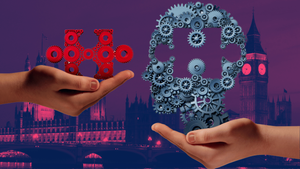The UK government is hoping to further placate MPs that want to include provisions around copyright and AI in the Data Bill that will be debated in the House Of Commons tomorrow by revising its position on a proposed new copyright exception. That proposal isn’t entirely off the table, but ministers say they are no longer favouring any proposals at all until they have worked their way through thousands of submissions made to the government’s recent consultation on copyright and AI.
The Guardian reports that sources close to technology minister Peter Kyle have said that proposals to introduce a new ‘text and data mining’ or ‘TDM’ exception to copyright law to benefit AI companies is “no longer his preferred option but one of several being given consideration”.
Kyle is also directly quoted by The Guardian insisting that the government is “listening to the consultation” and is “absolutely determined to get this right”. The government, Kyle adds, is “working hard to come up with practicable solutions to the very complex issue of how we enable both the creative industries and UK AI companies to flourish”.
The government previously proposed introducing a new TDM exception, but with an opt-out. That would allow AI companies to use copyright protected works to train their generative AI models without getting permission from the relevant copyright owners, except where rightsholders have formally ‘reserved their rights’. It would basically bring UK law in line with copyright rules in the European Union.
That proposal has been strongly opposed by the creative and copyright industries, including the music industry. Representatives of those industries also lambasted the government for basically coming out in favour of the new TDM exception before even starting the big consultation on copyright and AI.
There are also plenty of critics of the government’s approach within Parliament. Some MPs and Lords have argued that ministers should abandon the TDM exception and instead simply clarify the legal obligations of AI companies.
That would include forcing AI companies to be more transparent about what content they’ve used for training their models - and to negotiate licences with whoever owns the copyright in that content.
With ministers and officials still going through the thousands of submissions to the consultation, there is currently no timeline for when the government will formally propose any changes to copyright law. However, some Parliamentarians have tried to get new rules on copyright and AI into the law quicker by proposing amendments to the wide-ranging Data Bill that is currently working its way through Parliament.
When the bill was in the House Of Lords, a number of peers - led by the award-winning film producer and director Beeban Kidron (whose credits include directing 2004’s ‘Bridget Jones: The Edge Of Reason’) - proposed amendments to the bill that would require all AI platforms launching products in the UK to comply with British copyright law, as well as forcing AI companies to be transparent about how creative works are being used.
After the amended bill was passed by the House Of Lords, it moved to the Commons, where the government got those amendments removed. Part of the government’s argument was that issues to do with copyright and AI would be better addressed by specific legislation that the government would put forward based on the findings of its consultation.
However, with the bill set to be discussed again in the Commons tomorrow, a group of MPs – led Lib Dem Victoria Collins – are trying to get the Lords amendments put back into the bill, while Labour MP Alex Sobel is proposing a separate amendment around the transparency obligations of AI companies.
The government is still keen to push any new legislation around copyright and AI to a later date, and as a result, in the last week, ministers have started offering concessions to MPs and Lords who have been speaking up for the creative industries in the AI debate.
Obviously the Labour government has a massive majority in the Commons, which will ultimately allow it to get its way on the Data Bill - but it would probably prefer to do so without too many MPs and Lords – not to mention pop stars and other creators – from dissing it in public over the debate around AI training.
Last week The Guardian explained that ministers hoped to placate their critics by “promising to carry out an economic impact assessment of its proposed copyright changes and to publish reports on issues including transparency, licensing and access to data for AI developers”.
That, perhaps unsurprisingly, got a lukewarm response, with Kidron stating that “pushing the issue into the long grass with reports and reviews does not meet the moment”.
That seemingly led to government sources going one step further and insisting that the TDM exception - while still on the table - is no longer the government’s preferred option. Which basically means Kyle and his team are keeping a more open mind on all the different options while working through all the submissions to the consultation.
Responding to that latest shift, Kidron says, “I am glad to hear that the government no longer sees an opt-out proposal as the preferred option but … for this change to be in any way meaningful it must include an unequivocal commitment from the government to protect copyright holders right now”.
We will now see what happens as the Data Bill is debated in the Commons tomorrow.

